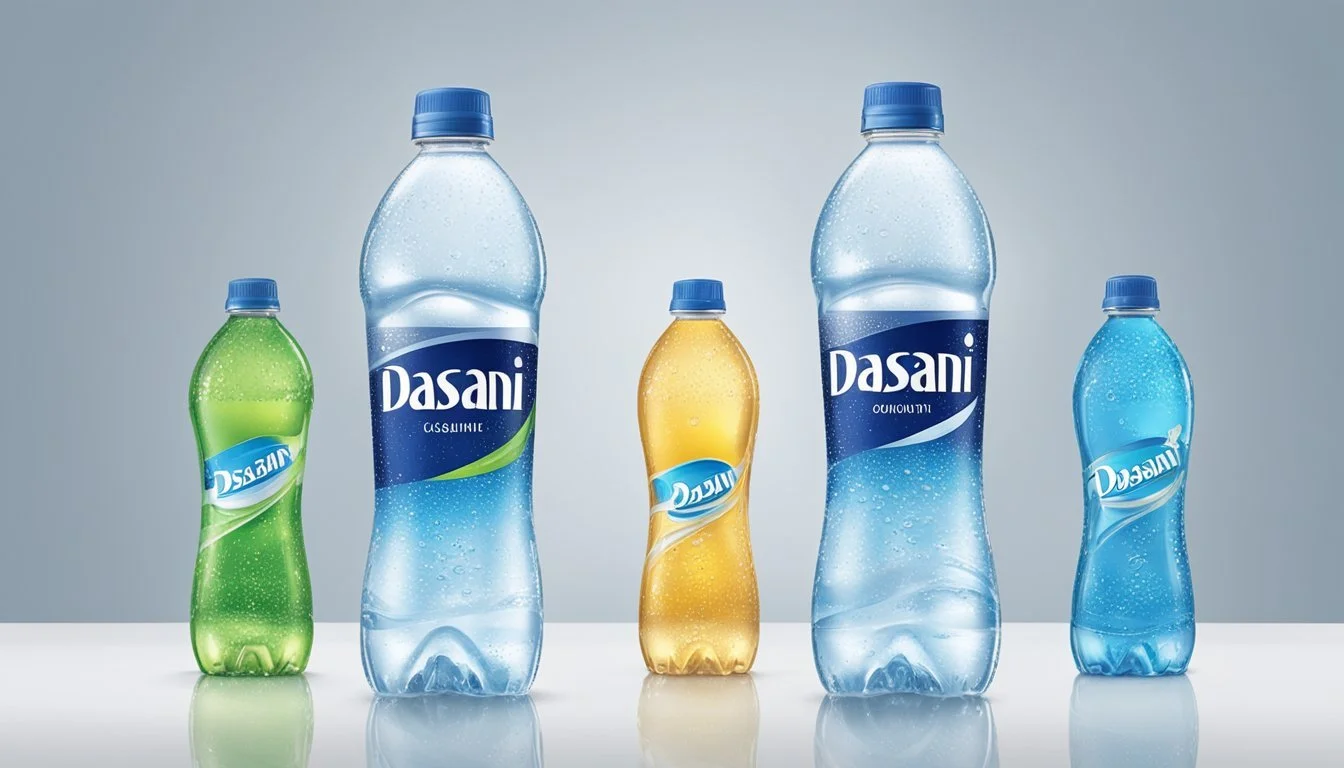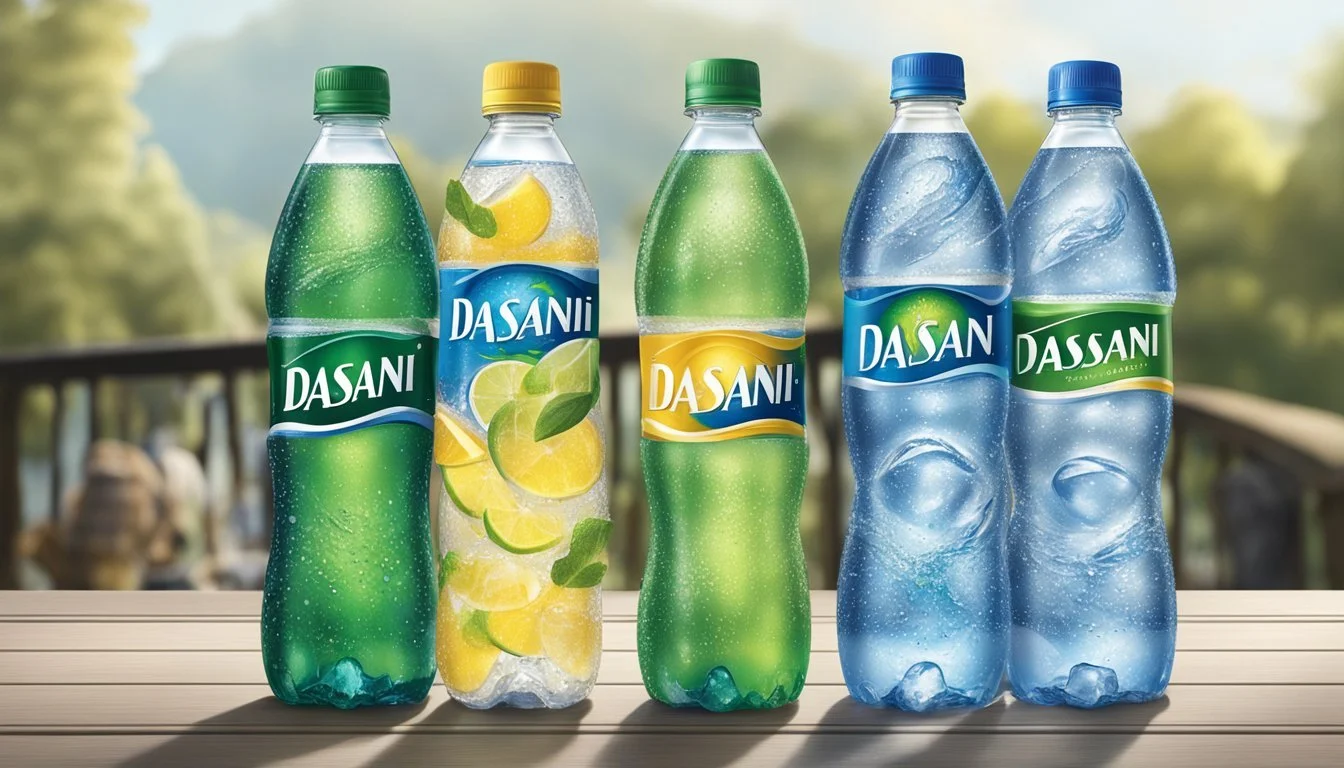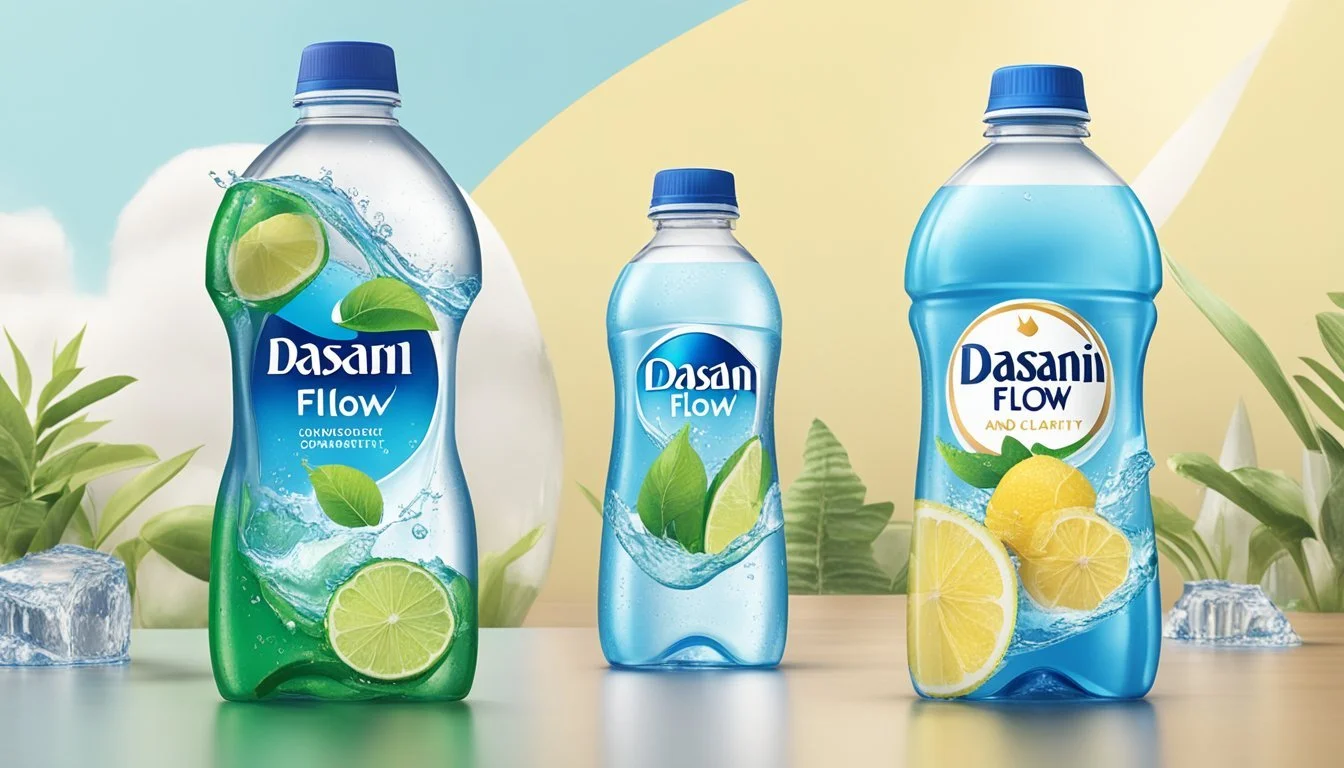Flow vs. Dasani
A Comparative Analysis of Bottled Water Quality
Flow and Dasani are two prominent bottled water brands, each offering unique features that cater to hydration needs. Flow stands out for its eco-friendly packaging and alkaline water sourced from natural springs, which is appealing to environmentally conscious consumers. Meanwhile, Dasani, produced by The Coca-Cola Company, prides itself on its rigorous purification process and the addition of a proprietary blend of minerals for a crisp taste.
When choosing between Flow and Dasani, consumers often consider taste, source, and environmental impact. Dasani uses reverse osmosis to purify its water, ensuring a clean flavor that's consistent across bottles, while Flow's water not only comes from natural springs but is also packaged in a way that minimizes plastic waste, making it a noteworthy choice for those concerned about the environment.
Both brands offer reliable hydration, but their distinct approaches highlight different priorities. Flow appeals to those prioritizing sustainability, while Dasani's emphasis on purification and taste might attract those seeking a trusted, widely available option.
Understanding Bottled Water
Hydration is crucial for maintaining health, and bottled water is a convenient way to achieve this. Various types of bottled water exist, each with its unique characteristics, and the bottled water industry is vast and competitive, featuring many well-known brands.
The Basics of Hydration
Hydration is essential for bodily functions such as temperature regulation, digestion, and nutrient transportation. Water, being the most direct source, plays a key role in maintaining these functions.
Proper hydration can support energy levels, cognitive functions, and overall well-being. Insufficient water intake, on the other hand, can lead to dehydration, affecting everything from mood to physical performance.
Types of Bottled Water
Bottled water can be categorized into several types, each offering different benefits:
Purified Water - Examples include Aquafina and Dasani. This water undergoes processes like reverse osmosis or distillation to remove impurities.
Spring Water - Sourced directly from springs. Brands like Poland Spring and Nestlé Pure Life fall into this category.
Mineral Water - Contains natural minerals. Evian and Fiji are popular choices.
Distilled Water - Highly purified, like Smartwater, often enhanced with electrolytes.
These distinctions are important for consumers looking for specific features in their water.
Bottled Water Industry Overview
The bottled water industry is expansive, with numerous brands competing for market share. Major players include Dasani, Aquafina, Fiji, and Evian. Each brand differentiates itself through unique selling points such as source, taste, and added minerals.
Statistics show that bottled water consumption has been steadily increasing, driven by factors such as health consciousness and convenience. This industry is regulated to ensure the safety and quality of the products offered to consumers.
Brands like Voss and Icelandic Glacial target the premium segment, while more accessible brands like Pure Life and Poland Spring cater to a broader market. Ethos Water, associated with social causes, highlights the diversification within this industry.
Profile: Flow Water
Flow Water is known for its natural spring water origin and commitment to environmentally friendly packaging. It also highlights its alkaline water's health benefits due to its natural mineral content.
Flow's Source and Filtration
Flow Water sources its water from natural springs. This means the water comes from the ground, naturally filtered by layers of rocks and soil.
The company emphasizes that its spring water is naturally alkaline and free from contamination.
Flow Water undergoes minimal filtration to maintain its natural mineral content. This method ensures the water retains its beneficial properties, contributing to its clean taste.
Alkalinity and Health Benefits
Flow Water is naturally alkaline, with a pH level around 8.1. This is higher than neutral water, which has a pH of 7, making it an alkaline choice.
Alkaline water is believed to offer several health benefits. These might include aiding in acid-neutralization in the body and improving hydration more effectively compared to regular water.
Consumers who prefer alkaline water often cite its potential to increase energy levels and help with digestion.
Packaging and Environmental Considerations
Flow Water prioritizes environmentally responsible packaging. Its water bottles are made from Tetra Pak cartons, which are primarily plant-based and recyclable.
The company aims to reduce its environmental impact by using renewable materials and focusing on sustainability. This reduces plastic waste and promotes a lower carbon footprint.
Flow Water's packaging also keeps the water fresh, protecting it from light and air which can degrade water quality over time.
Profile: Dasani Water
Dasani, a brand under Coca-Cola, is known for its purification process and the addition of minerals that enhance both taste and health benefits. Dasani also emphasizes sustainable packaging.
Dasani's Purification Process
Dasani undergoes a thorough purification process that includes reverse osmosis. This method ensures that impurities and contaminants are removed from the water.
The reverse osmosis process is advanced and effective, making Dasani water pure and safe to drink.
Following this, the water is further treated to improve its taste and quality. The combination of technologies ensures a consistent and high-quality product.
Added Minerals for Taste and Health
To enhance the flavor, Dasani water incorporates several minerals. These include magnesium sulfate, potassium chloride, and a small amount of salt.
Magnesium sulfate adds a slightly bitter taste, balancing the overall flavor profile.
Potassium chloride is included to provide a slight saltiness, which can improve hydration. The final blend of minerals makes Dasani water enjoyable and potentially beneficial for health.
Packaging and Sustainability
Dasani water is packaged in BPA-free plastic bottles. These bottles are designed to be recyclable and are made from up to 30% plant-based material. This aligns with Coca-Cola's initiative to reduce plastic waste and improve sustainability.
Dasani also promotes the reuse and recycling of its bottles, encouraging consumers to reduce their environmental impact. The combination of recyclable materials and consumer education efforts highlights Dasani's commitment to sustainability.
Quality and Safety Standards
Flow and Dasani adhere to strict guidelines to ensure the quality and safety of their bottled water. By complying with regulatory standards and conducting thorough contaminant testing, both brands focus on providing safe drinking water to consumers.
Regulations and Compliance
Flow and Dasani must comply with FDA regulations as bottled water is classified as a food product. The FDA sets standards for contaminants, labeling, and processing to ensure safety.
Flow is naturally alkaline spring water, known for its minimal processing, and the source is monitored regularly. Dasani uses reverse osmosis filtration and adds minerals for taste, ensuring it meets quality standards.
Both brands are required to disclose their water sources and purification processes, providing transparency to consumers. Regular audits and testing are conducted to maintain compliance and ensure the absence of harmful substances.
Contaminant and Impurity Testing
To guarantee safety, Flow and Dasani conduct rigorous testing for contaminants and impurities. Flow focuses on protecting natural mineral content and avoiding contamination by regularly testing for heavy metals, pathogens, and other pollutants.
Dasani employs a multi-step filtration process including reverse osmosis, which effectively removes potential contaminants. Post filtration, Dasani adds a blend of minerals like magnesium sulfate, potassium chloride, and salt, which are also tested for safety.
Both brands ensure that their water contains no harmful levels of contaminants, with testing results often available for public review. This commitment to quality control helps maintain consumer trust and product safety.
Health and Hydration Benefits
Flow and Dasani bottled waters both offer unique benefits when it comes to health and hydration. By examining the electrolytes and minerals content as well as their overall impact on hydration and health, this section sheds light on which might be the better choice.
Electrolytes and Mineral Content
Flow water is known for its natural alkaline pH and essential minerals. It contains calcium, magnesium, and potassium, which are vital for maintaining proper bodily functions. These minerals can help regulate muscle function, support heart health, and maintain strong bones.
Dasani water, on the other hand, undergoes reverse osmosis filtration. Minerals such as magnesium sulfate, potassium chloride, and salt are added back to enhance taste. While these minerals are safe and can support hydration, they are not naturally occurring in the water.
Comparison Table of Key Minerals:
Mineral Flow Dasani Magnesium Yes Yes Calcium Yes No Potassium Yes Yes
Flow’s naturally occurring minerals might appeal more to those looking for water that supports a healthy lifestyle. Dasani's mineral enhancements make it a clean choice, but some might prefer the natural content found in Flow.
Hydration and Overall Health
Proper hydration is crucial for maintaining good health, and both Flow and Dasani aim to provide clean and crisp water options. Flow's natural minerals contribute to electrolyte balance, which can improve hydration by aiding in fluid retention and muscle function.
Dasani's filtration process ensures purity, and the added minerals help enhance taste, making it an appealing option for those who may not drink enough water otherwise. The added potassium and magnesium in both brands aid in maintaining muscle and nerve function.
Drinking adequate water from either brand can help prevent dehydration, support digestion, and improve skin health. The choice between the two might come down to personal preference for natural minerals versus enhanced taste.
Flow’s naturally sourced water and Dasani’s purified method both offer significant hydration benefits, catering to different needs and preferences.
Taste Profile Comparison
Both Flow and Dasani offer distinct taste profiles influenced by their unique mineral content and purification processes. This section explores these variations to help consumers decide which bottled water suits their palate.
Flavor Influences and Preferences
Dasani is known for its clean, crisp taste, achieved through a purification process including reverse osmosis. The addition of a proprietary blend of minerals contributes to its distinct flavor, often described as having a slight mineral essence.
Flow boasts a naturally alkaline taste profile, thanks to its artesian spring source. It contains calcium, magnesium, and potassium, lending it a smooth and subtly sweet flavor.
Preferences for these waters often hinge on personal tastes. Those favoring a mineral taste might prefer Dasani, while those seeking a naturally alkaline water might lean towards Flow. The choice ultimately depends on individual flavor preferences and mineral content.
The Debate on Tap vs. Bottled Water
Tap and bottled water are compared in terms of quality, convenience, cost, and environmental impact, providing key insights for consumers.
Quality and Convenience Factors
Tap water is subject to strict regulations by government agencies. It usually undergoes rigorous testing and treatment to ensure safety. Municipal water supplies are often monitored more stringently compared to private bottled water companies.
Bottled water offers convenience as it is readily available in stores and can be easily carried on the go. Dasani, for example, is a popular brand that appeals to consumers due to its accessibility and consistent taste.
Some consumers prefer the taste and carbonation options available in bottled water. However, the quality of tap water can be just as high, depending on local treatment processes.
Cost and Environmental Impacts
Tap water is highly cost-effective. Users typically incur just the cost of the water bill, making it extremely economical. In contrast, bottled water like Dasani can be significantly more expensive per gallon compared to tap.
Environmental impact is a significant concern with bottled water. The production and disposal of plastic bottles contribute to pollution. Conversely, tap water does not require plastic packaging, thereby reducing waste.
Moreover, the bottling process and transportation of bottled water increase carbon footprints. Choosing tap water over bottled options can help mitigate these environmental effects. Utilizing reusable bottles for tap water is a sustainable alternative.
Price and Value Analysis
Flow and Dasani offer different pricing structures and value propositions. This section examines their cost per bottle and what kind of value these options provide to consumers.
Comparing Cost per Bottle
Flow and Dasani vary in their pricing, with differences often arising from the source and packaging. Dasani, a product of Coca-Cola, tends to be competitively priced. It can often be found in stores at $1-$2 for a single 16.9 oz bottle.
Flow, known for its premium packaging and alkaline properties, generally costs more. Prices for Flow typically range from $2.50-$3 for the same size. This higher cost is partly due to the eco-friendly packaging and the perceived health benefits.
Retail price fluctuations exist, but these average costs are useful benchmarks for consumers comparing both brands.
Value for Money and Consumer Choices
Consumers looking for bottled water often consider both the price and the perceived value. Dasani, although cheaper, offers added electrolytes but hasn't been praised for superior taste. This makes it a good choice for those wanting a basic, reliable option.
Flow, on the other hand, markets itself as a premium option with added benefits like natural alkaline content and eco-friendly packaging.
For consumers who value sustainability and are willing to pay more, Flow provides greater value.
Thus, the final choice often depends on individual preferences regarding health benefits, environmental concerns, and budget. Both brands cater to different segments, providing various levels of value based on consumer needs and preferences.
Environmental and Sustainability Considerations
Both Flow and Dasani have distinct approaches to environmental impact and sustainability, particularly in their use of plastic bottles and innovative packaging solutions. These differences are crucial when evaluating their overall eco-friendliness.
Impact of Plastic Bottles
Plastic bottles are a significant concern in the bottled water industry. Dasani uses plastic bottles that are 100% recyclable, which helps reduce waste. However, the production of these plastic bottles requires fossil fuels, contributing to carbon emissions and environmental degradation.
On the other hand, Flow takes a different route by offering water in Tetra Pak cartons, which are also recyclable. These cartons are made from paperboard sourced from sustainably managed forests. This approach minimizes the reliance on plastic bottles, thereby reducing environmental impact significantly. Nonetheless, the Tetra Pak cartons still require proper recycling facilities, which can vary by region.
Sustainable Packaging Innovations
Dasani has introduced plant-based bottles, which are partially made from renewable materials. This initiative aims to decrease the brand’s reliance on petroleum-based plastics. While these plant-based bottles are a step towards sustainability, they are not entirely biodegradable and still contribute to plastic waste if not recycled properly.
Flow stands out with its carton packaging, which includes a cap made from sugarcane plastic—a renewable resource. Additionally, Flow’s packaging efforts focus on reducing the carbon footprint over the lifecycle of the product. The company also emphasizes water source sustainability, using springs that naturally replenish themselves, ensuring long-term viability.
Combining innovative materials and focusing on sustainable practices, both brands aim to lower their environmental footprint.
Consumer Insights and Preferences
Both Flow and Dasani have dedicated consumer bases with differing preferences. This section examines market trends and demographics as well as feedback and social media sentiment to provide a comprehensive understanding.
Market Trends and Demographics
Flow is appealing to younger, eco-conscious consumers who prioritize sustainability in their purchasing decisions. Its packaging, made from renewable resources, is a significant draw.
Dasani, with its extensive market presence, is more popular among consumers who value consistency and availability. The brand leverages Coca-Cola's distribution network to maintain a strong retail presence.
Age-wise, Flow tends to attract Millennials and Gen Z, while Dasani finds favor across a broader age spectrum. Additionally, urban areas show higher sales for Flow, attributed to its modern branding and environmental focus.
Feedback and Social Media Sentiment
Flow receives praise for its clean taste and eco-friendly packaging. Consumers express their approval on platforms like Twitter and Instagram, often highlighting the minimalist design and sustainable approach.
Dasani's feedback varies, with some consumers appreciating its mineral-enhanced taste, while others critique it for added ingredients. Social media sentiment is mixed; it's often compared to other brands for taste and quality.
On Twitter, discussions about Flow focus on sustainability and taste, whereas Dasani debates center around its mineral content and availability. This online buzz significantly influences consumer perceptions and preferences.
Concluding Thoughts
When comparing Flow and Dasani, several factors merit consideration.
Hydration
Both brands effectively deliver hydration. Flow, recognized for being naturally alkaline with electrolytes, appeals to those seeking enhanced water quality. Dasani utilizes advanced purification through reverse osmosis, ensuring clean water.
Health Benefits
Flow's alkaline nature and mineral content may support hydration and pH balance. Dasani offers purified water free from sugar and calories, which aligns well with health-conscious consumers.
Consumer Insights
Preferences often hinge on taste and brand ethos. Flow's eco-friendly packaging attracts environmentally conscious buyers. Dasani's widespread availability and clean taste make it a convenient choice.
Comparison Table
Feature Flow Dasani Filtration Naturally alkaline Reverse osmosis Mineral Content High Moderate Packaging Eco-friendly box 100% recyclable bottle Taste Smooth Clean, crisp Health Focus Alkaline, minerals Sugar-free, zero cal
More About Flow
Flow vs Whole Foods Italian Still Mineral water: Which Bottled Water is Better?
Mountain Valley Spring Water vs Flow: Which Bottled Water is Better?







